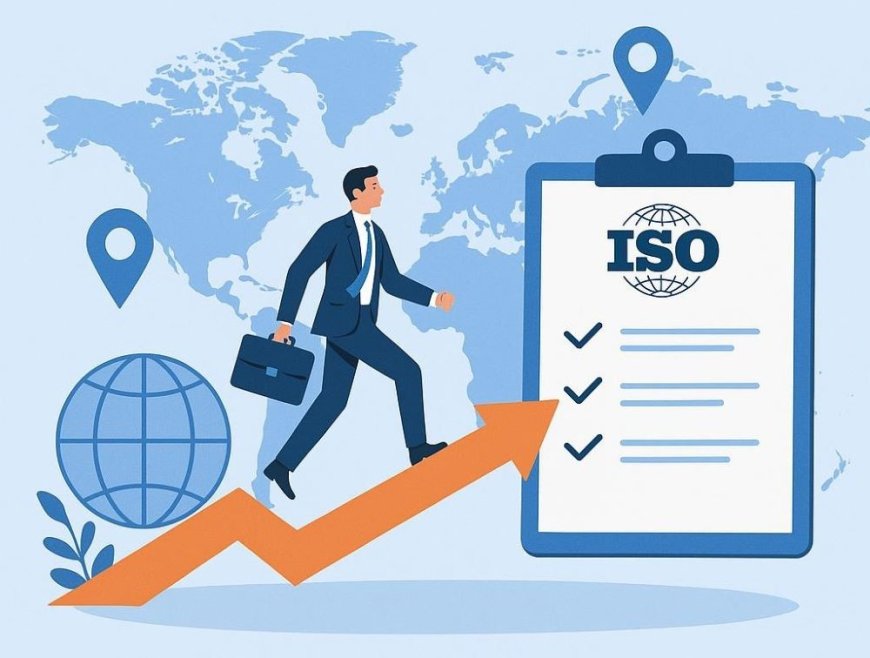How ISO Certification Can Propel Your Business Across Borders
ISO Certification shows proof that an organization has implemented an ISO management system that adheres to the requirements of the ISO standard.

Running a business in today’s global marketplace comes with its fair share of challenges. From managing supply chains that span continents to meeting local regulations and keeping customers satisfied, it's no small feat. Yet, amid these complexities, there’s one powerful tool that can help companies thrive across borders: ISO certification.
While ISO (International Organization for Standardization) may sound like a complex and somewhat technical concept, it’s actually a key ingredient for fostering trust, boosting operational efficiency, and opening doors to new markets. So, why is ISO certification so crucial for companies with global operations? Let’s unpack that.
Building Trust Across Borders: The Power of ISO Certification
One of the primary reasons companies seek ISO certification is to build trust—trust with suppliers, customers, and partners. In international business, trust is everything. When you’re dealing with companies in multiple countries, across various regulatory landscapes, and with diverse cultural expectations, having a universally recognized certification speaks volumes.
ISO certification isn’t just about meeting quality standards—it’s about demonstrating that your company is serious about consistency, reliability, and adherence to internationally accepted principles. When you're ISO certified, whether you’re shipping products from one continent to another or setting up operations in a new market, you're sending a clear message: "We operate at the highest standards, no matter where we do business."
Not Just a Certificate: ISO as a Long-Term Strategic Advantage
For companies operating globally, ISO certification isn’t just a badge to wear; it’s a long-term strategy. Here’s how:
1. Streamlined Operations Across Borders
When your company operates internationally, the complexity of managing operations in different regions can lead to inefficiencies, inconsistent quality, and risk. ISO standards, on the other hand, offer a structured framework that harmonizes operations, ensuring consistency across all markets.
· Unified Processes: Instead of having to reinvent the wheel in each region, ISO certification gives you a set of globally recognized standards that help streamline processes and workflows.
· Reduced Waste: By adhering to these standards, you can minimize resource waste, making your operations more efficient and environmentally friendly, which is a growing priority for businesses everywhere.
· Faster Decision-Making: ISO guidelines create clear benchmarks for quality and safety, allowing leadership teams to make decisions quickly and with confidence.
2. A Universal Language for Quality
ISO certification serves as a common language for companies worldwide. No matter where you’re doing business, your certification speaks to quality. And when you’re working with international suppliers and partners, this becomes invaluable.
· Consistency in Quality: For instance, if you’re working with a factory in Vietnam and shipping products to customers in Canada, ISO certification ensures that the same high standards of quality are maintained across all stages of production and delivery.
· Easier Supplier Relationships: Suppliers are more likely to trust your company if they know that you meet globally recognized standards, fostering better relationships and smoother transactions.
ISO Certification and Market Access: A Gateway to New Opportunities
Many industries and markets require ISO certification before you can even consider entering. The certification acts as your ticket to these regions, creating new avenues for growth. Whether it’s dealing with new international clients, securing government contracts, or entering heavily regulated sectors, ISO certification often opens doors.
1. Opening Doors to Competitive Bidding
International tenders, government contracts, and large enterprise deals often require ISO certification as a prerequisite. Think of it as the entry fee to a highly competitive game where not having ISO certification could leave you out of the running entirely.
· Increased Credibility: If you’re looking to bid on international projects, many clients and governments will require proof that you comply with ISO standards. Without it, you may not even get your foot in the door.
· Stronger Partnerships: ISO certification increases your credibility and shows potential partners that you're a reliable business with the operational standards to back up your claims.
2. Complying with International Standards
Different countries have different regulations when it comes to safety, product quality, environmental concerns, and more. ISO standards provide a common ground for compliance across borders, ensuring that your business can meet local laws without the headache of navigating each country's complex regulations.
· Simplified Compliance: With ISO standards in place, you don’t need to worry about constantly adjusting to changing regulations in every market. Instead, ISO certification helps ensure that your processes are aligned with the most stringent global requirements.
· Market Trust: Customers, especially those in highly regulated industries like healthcare or food production, prefer to buy from ISO-certified companies because it assures them that products meet safety and quality standards.
ISO Certification as a Catalyst for Continuous Improvement
ISO certification is not a one-time effort; it's a commitment to continuous improvement. After obtaining your certification, you’ll be expected to regularly evaluate your processes, measure performance, and make improvements based on what you learn.
1. Fostering a Culture of Excellence
ISO certification pushes your company to not only meet basic standards but to constantly raise the bar. It encourages a mindset of continuous growth and innovation. For global businesses, this is invaluable.
· Employee Engagement: When ISO standards are part of your company culture, employees become more engaged and motivated to perform at their best. After all, they’re working for a company that values quality and improvement at every level.
· Benchmarking Success: ISO standards provide clear benchmarks for success, allowing your company to assess performance across regions and identify areas for improvement.
2. Reducing Risks and Improving Resilience
International operations come with a host of risks—be it supply chain disruptions, compliance issues, or security threats. ISO certification helps mitigate these risks by instituting robust risk management frameworks and processes.
· Proactive Risk Management: ISO’s focus on identifying and managing risks ensures that your company is better prepared for disruptions, whether it’s a supply chain bottleneck or a sudden regulatory change in one of your markets.
· Long-Term Sustainability: With its emphasis on continuous improvement and risk management, ISO certification ensures your business is more resilient and prepared for future challenges, no matter where they come from.
A Few Key Points to Remember About ISO Certification
ISO isn’t just about compliance; it’s about commitment to improvement
It’s not just a box to check—ISO certification demonstrates that your business is constantly evolving to meet the needs of the market and your customers.
It’s about consistency, not perfection
Achieving ISO certification is less about reaching a “perfect” state and more about ensuring that your processes are consistent, repeatable, and reliable, no matter where in the world you operate.
It opens doors—but it doesn’t guarantee success
While ISO certification can significantly enhance your credibility and operational efficiency, success in global markets depends on how well you execute your strategy beyond just meeting certification standards.
Is ISO Certification Worth the Investment for Your Company?
The truth is, ISO certification requires time, effort, and financial investment. But for companies operating internationally, it’s an investment that pays off in the form of improved efficiency, trust, market access, and long-term sustainability. ISO standards help create a framework that ensures you’re operating at the highest possible level, no matter the complexity of your global operations.
So, the real question isn’t whether ISO certification is worth it—but rather, can your business afford not to be ISO certified in a world that’s more connected, competitive, and regulated than ever before?

















































































































![Are AI Chatbots Replacing Search Engines? AI vs Google [New Research]](https://www.orbitmedia.com/wp-content/uploads/2025/05/How-often-are-we-using-AI-chatbots_.webp)


































